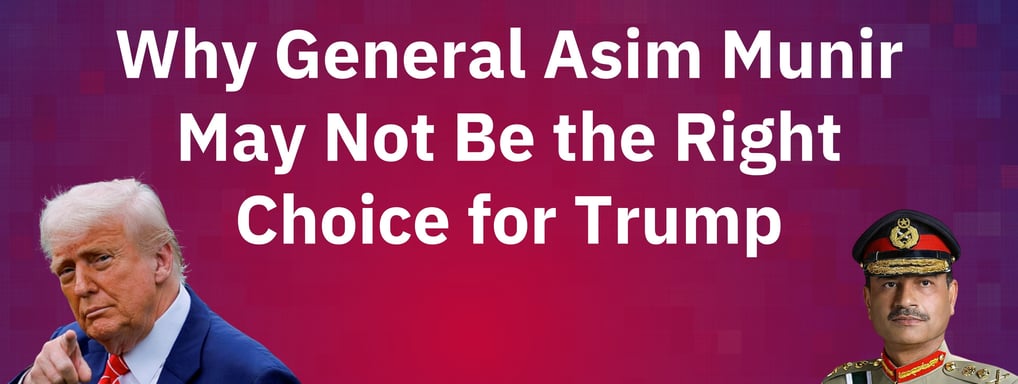
Why General Asim Munir May Not Be the Right Choice for Trump – Strategic and Human Rights Implications
Former U.S. President Donald Trump's meeting with Pakistan's General Asim Munir raises questions about democratic alignment, human rights concerns, and foreign policy optics. Read the full analysis here.
U.S.–PAKISTAN RELATIONS
6/18/20252 min read


On June 18, 2025, former U.S. President Donald Trump met privately with Pakistan’s Chief of Army Staff, General Asim Munir, during a closed-door luncheon in Washington, D.C. The meeting made headlines after Trump praised Munir for helping to "prevent a war with India" and referred to him as a stabilizing influence in the region.
While such diplomatic gestures are not uncommon, this particular engagement has sparked serious debate among human rights observers, foreign policy analysts, and members of the Pakistani-American community.
Key Human Rights Concerns
Multiple international human rights organizations have released reports over the past few years highlighting concerns regarding the state of civil liberties and governance in Pakistan. Many of these issues have emerged or intensified during the tenure of General Asim Munir.
Mass Detentions of Political Activists
Amnesty International and Human Rights Watch have reported widespread arrests of political workers, particularly during and after the 2024 elections.
Many detainees were held without formal charges, raising concerns about due process and judicial independence.
Suppression of Press Freedom
Reporters Without Borders (RSF) has documented repeated cases of news channel suspensions, censorship, and intimidation of journalists covering opposition voices or state actions.
Independent journalism in Pakistan remains under considerable strain.
Use of Military Courts for Civilians
Legal experts and civil rights groups have questioned the practice of trying civilians in military courts, which typically lack transparency and appellate protections.
This practice has been described as incompatible with international norms of justice.
Digital Censorship and Surveillance
Freedom House and digital rights group Bytes for All have reported on frequent internet blackouts, social media blocks, and surveillance activities during key political moments.
These restrictions have directly impacted protest organizers, journalists, and political parties.
These concerns are not personal accusations, but instead highlight systemic issues that raise red flags for democratic engagement and international partnerships.
Strategic and Diplomatic Implications
Engagement with General Munir has broader consequences beyond optics:
India’s Position: India has publicly rejected the idea that any third-party—particularly the U.S.—played a role in past de-escalation efforts. Indian officials assert that military-level bilateral talks achieved ceasefires without external involvement.
Diaspora Reactions: Pakistani-American communities across the U.S., particularly in Washington D.C., staged peaceful protests during Munir’s visit. Many expressed frustration with what they see as international legitimization of undemocratic governance.
Mixed Messaging for U.S. Policy: By publicly embracing figures associated with political suppression, Trump risks alienating human rights advocates and undermining American democratic messaging abroad.
Conclusion
General Asim Munir holds a significant position in Pakistan’s strategic and military hierarchy. However, his leadership period overlaps with a time marked by institutional concerns over civic space, press freedom, and democratic transparency.
For Donald Trump — or any U.S. leader — engaging with such a figure may carry unintended reputational risks. While diplomatic outreach is essential, it must be paired with caution, clarity, and alignment with fundamental values of democracy and human rights.
Disclaimer
This article is based on publicly available news sources and independent human rights reports. It is intended for informational and educational purposes only. The analysis herein does not allege or imply criminal misconduct by any individual. Interpretations are made in good faith to support public awareness, democratic discourse, and policy reflection.
Voice of Pakistani Americans
TOGETHER WE CAN DO IT!
Support
© 2025. All rights reserved.


